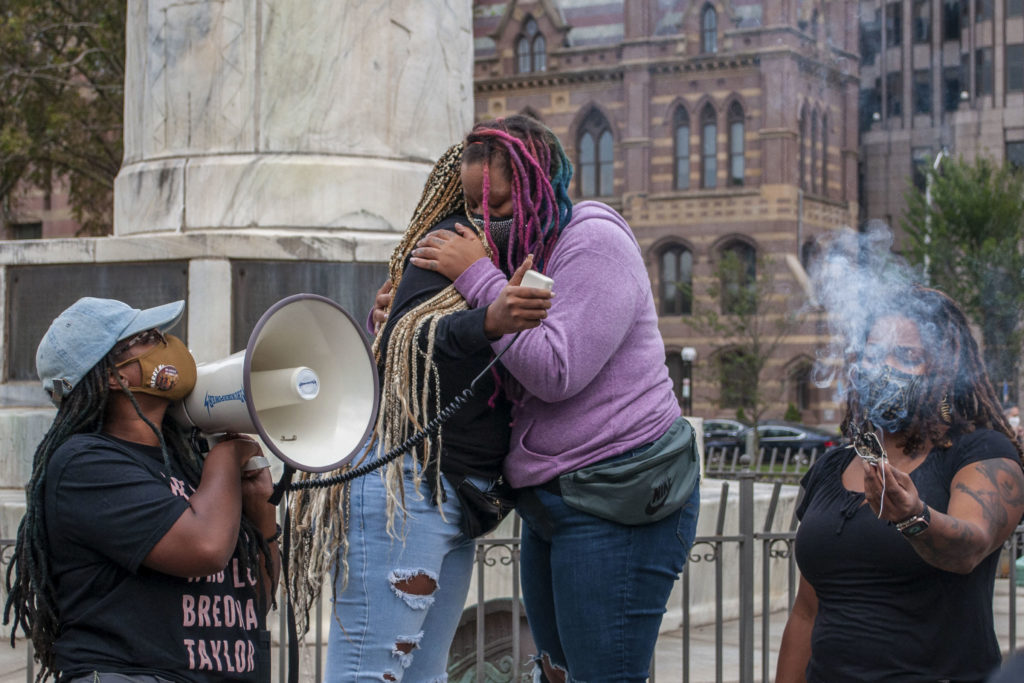
Courtesy of Karen Lin
On Thursday afternoon, 250 community members and students gathered on the New Haven Green to protest the lack of charges against three Louisville police officers who fatally shot Breonna Taylor, a Black woman whose death reinvigorated nationwide conversations over race and police brutality.
The protest was organized by Black Lives Matter New Haven and follows Wednesday’s decision by a Kentucky grand jury to charge only one of the officers involved with the shooting, Brett Hankinson, with three counts of wanton endangerment in the first degree. The charge of wanton endangerment has been levied against Hankinson not because of Taylor’s death, but instead due to the endangerment of the neighboring apartment’s residents. It is a Class D felony with a maximum sentence of five years.
The organization described the ruling as “meaningless” and called for the court to take a harsher stance. A scattered group of New Haveners, donning masks and attempting to social distance as much as possible, gathered around a half-mast flag and a smattering of megaphone-wielding speakers. The event began with a BLM-organized rally and prayer. At around nightfall, demonstrators left the Green and proceeded to march south through downtown New Haven, where they continued to chant and obstruct traffic for several hours.
“The real mission of today is reawakening people in our city not only to Breonna Taylor, because of course her story and her legacy moves on through us, [but] also thinking of the folks that we have lost through police brutality and police violence in New Haven and in Connecticut,” lead BLM organizer Amelia Sherwood told the news.
Sherwood — who serves as the anti-bias and anti-racism director at Elm City Montessori public elementary school — was the first to speak to the gathering crowd on the Green. She is no stranger to protests, having led approximately 1,000 demonstrators in a march down I-95 and I-91 in New Haven over the death of George Floyd in late May.
Sherwood similarly led Thursday evening’s protestors into the busy streets of downtown New Haven, halting the passing of traffic and attracting the attention of onlookers. Some peeked out of restaurants to record while others honked in support from their cars.

Bobby Gonzalez ’24, among the first students present at the protest, expressed the importance of showing up for the New Haven community of which he is now a member. He added that showing solidarity is “especially hard” during the pandemic, but that coming to the protest made him feel less “alone when hearing terrible news.”
Gonzalez said he was experiencing “a lot of emotions” at the protest, and that above all, he hoped people would “come together to heal.”
But some community members, like Black New Haven resident Madison Alexis, hoped that the protest would ignite “adrenaline” and “anger” towards the grand jury’s ruling.
“The verdict yesterday was really upsetting,” Alexis told the News in an interview. “This is much deeper than just showing up to a rally and listening to other people speak.”
While Hankinson was one of three police officers that opened fire in Taylor’s Louisville home on March 13, he is the only officer charged with any wrongdoing in the emergency room technician’s death. The jury’s decision has caused a resurgence in national protests, most notably in her hometown.
Alexis emphasized holding peers and academic institutions “accountable” in the fight for racial justice. A student at Southern Connecticut State University, Alexis urged students from other colleges and universities in New Haven, including Yale, to speak out about these issues even if they do not “directly affect” them.
Jaeana Bathea, a Black New Haven high school student, underscored Alexis’ point as she spoke into a megaphone.
“We are not going to pretend that this is normal, because it’s not,” Bathea said as she approached tears. “We are living in a movie. This is literally a scene out of a movie.”
Bathea was frustrated with what she felt were irreverent responses from some of her classmates and teachers to the indictment. She was especially upset that a conversation over the indictment was not addressed by her teachers.
“They should’ve talked about it, they know they’re educating Black and brown kids,” Bathea said.
In a conversation with the News, Jaelen King ’22, brought up Bathea’s speech to emphasize the “somber” emotional nature of Thursday’s gathering and the broader conversation on race in America.
“The indictment shouldn’t be an inconvenience or brushed off,” King said. “It’s something that’s really negatively affecting communities.”
King is co-president of Black Students for Disarmament at Yale — a student-run activist group that looks to act as a “system of support” for New Haven community members and organizations. It is currently focused on dismantling the Yale Police Department, the oldest collegiate police force in the United States.
Yesterday, BSDY drafted an open letter to the Yale administration demanding they disarm and defund the YPD. The group also called for Yale to reinvest in “New Haven organizations that protect, serve and uplift Black and Brown communities.”
Breonna Taylor was shot 6 times on the night of her death.
Ángela Pérez | angela.perez@yale.edu
Zaporah Price | zaporah.price@yale.edu







